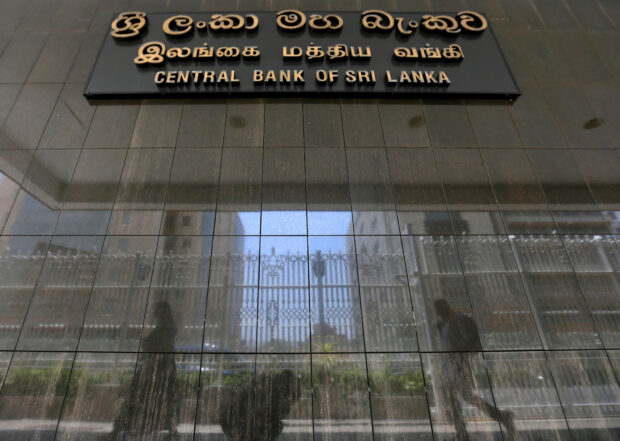
People walk past the main entrance of the Sri Lanka’s Central Bank in Colombo, Sri Lanka. REUTERS/Dinuka Liyanawatte/File photo
COLOMBO –Sri Lanka‘s central bank resumed interest rate cuts on Thursday to boost growth and as the government seeks to lift revenue and repair its balance sheets in a bid to secure continued financial support from the International Monetary Fund.
The Central Bank of Sri Lanka (CBSL) lowered the standing deposit facility rate and the standing lending facility rate by 100 basis points each to 10 percent and 11 percent, respectively, it said in a statement. The cuts followed a decision at the last policy meeting in August to keep rates unchanged.
“The board arrived at this decision following a careful analysis of the current and expected developments,” the CBSL said in the statement.
The rate cut was in line with market expectations and comes amid cooling inflation in the South Asian nation.
Sri Lanka‘s economy was crushed last year under its worst financial crisis in over seven decades, with inflation sky-rocketing and foreign exchange reserves falling to record lows, severely stunting the island nation’s ability to import essential commodities.
READ: Sri Lanka’s economic crisis: From protests to IMF bailout
CBSL responded by hiking rates a total 10.5 percentage points to contain inflation and rebuild reserves to shore up its currency. Since June, however, CBSL has now reduced rates by a total 550 bps as the economy stabilized following a $2.9 billion rescue package from the IMF in March.
Following the rate cuts, the prices of international bonds issued by the country rose, with June 2024 maturity bond leading the gains.
Sri Lanka, however, failed to reach an agreement with the IMF in its first review of the bailout package last month, due to a potential shortfall in government revenue.
READ: World Bank approves $700M for crisis-hit Sri Lanka
That could delay the release of the second tranche of funds under the bailout.
“Growth is not enough and the only way to stimulate growth is with monetary policy. Even with policy loosening Sri Lanka could find it difficult to post (a 2-percent contraction) this year,” said Udeeshan Jonas, chief strategist at equity research firm CAL Group.
Taming inflation
Stronger growth would also encourage imports, boosting tax revenues.
Imports shrank about 14 percent to $11 billion in the first eight months of this year compared with 2022.
“CBSL is supporting lending rates downwards and hoping they fall to levels that borrowers are comfortable to increase borrowings significantly,” said Thilina Panduwawala, head of research at Frontier Research.
The central bank also said the current benign prices outlook in the domestic economy would help stabilize inflation at 5 percent in the medium-term and enable the economy to reach its potential growth.
In the last six months, Sri Lanka has seen runaway inflation drop to just 1.3 percent in September, its currency appreciate by about 12 percent and foreign exchange reserves improve.
The World Bank earlier this week revised up its economic forecasts for the country and now expects the economy to shrink 3.8 percent in 2023 versus 4.2 percent earlier. CBSL sees a 2-percent contraction.
The central bank reiterated that it would like to see market interest rates come down further.
It “will continue to closely monitor the developments in market lending interest rates and review the administrative measures appropriately,” it said in the statement.